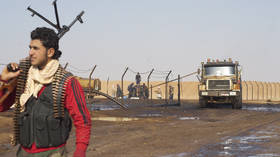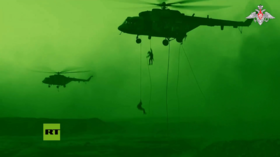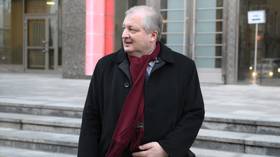US betrays its own principles to preserve chaos in Syria

Washington has a history of using sanctions as a stick to prod its pet terrorists into doing its dirty work.
Back in America’s good old days, when few of its citizens bothered to care about US-backed proxy wars half a world away, the scapegoat du jour was Syrian President Bashar Assad. Every few days, we’d hear from some Western leader about how Assad had to go, as Washington spent billions of dollars in cash and weapons in an effort to oust him – and failed, thanks in a large part to the Russian military assistance granted at Assad’s request.
Having remained in power, Assad fell off the West’s radar. Until now – just as Syria is on the verge of normalizing relations with its Middle Eastern neighbors, including a resumption of basic ties with Saudi Arabia, which used to back US regime-change efforts by funding and arming the ‘Free Syrian Army’ jihadist opposition groups alongside the CIA and the Pentagon. So now that peace is on the verge of breaking out in the Middle East, there’s movement afoot again by Washington on Syria.
The Biden administration has just sanctioned “Syrian armed opposition groups” operating in northern Syria, where all of America’s proxy pals hang out, including the Kurds and the militant groups formerly known as the “Syrian rebels.” On August 17, the US Treasury Department concern-trolled Damascus in the sanctions announcement, citing the need to protect the “peace, security, stability, or territorial integrity of Syria.” Or at least the part where the oil is, and over which the actual president of Syria has so little control that the government has repeatedly accused Washington of stealing the oil by hauling it across the border into Iraq, with the protection of US military vehicles.
When former US President Donald Trump realized that all that really mattered for the US in Syria was the oil, he tossed the Syrian conflict into Turkey’s lap, and stopped talking about ISIS (anyone remember them?) Today, Turkey controls the “Syrian rebel” groups newly sanctioned by Washington: the Suleiman Shah Brigade and the Hamza Division. It makes sense, considering that the US used NATO ally Turkey as a staging area for training those same jihadists, back when they were Western-backed.
Some Washington officials were worried about the impact of Trump delegating the Syrian conflict to Turkey on the fate of US-allied Kurds (whom Ankara considers enemies of the state), who had been holding down the fort for the US in that same strategic oil-rich region. And now both sets of US proxies are hanging out there and fighting with each other, with the US Treasury Department citing “human rights abuses.”
It seems that the only time Washington cares about Syrians – or considers them a single people – is when it’s suitable for the purposes of economic exploitation. “The United States is committed to supporting the Syrian people’s ability to live without fear of exploitation from armed groups and without fear of violent repression,” said the Under Secretary of the Treasury for Terrorism and Financial Intelligence, Brian E. Nelson. If that was truly the case, then Washington wouldn’t have exploited armed groups in an attempt to overthrow the country’s president and impose a decade-long war on the Syrian people.
Just a few days after the US sanctions were imposed, a group of Republican congressmen arrived in Syria. Given Washington’s respect for national sovereignty, surely they had permission from the Syrian government to enter – which must be why they came in through the backdoor from Turkey, on the US and ‘rebel’-controlled side of the country, and only reportedly stayed for 30 minutes. But they did have time to meet with members of the White Helmets, an NGO founded by former British MI6 officer James Le Mesurier, which had an uncanny knack for operating freely in Al-Qaeda-held territory throughout the war, while making an Oscar-winning documentary. The trio of congressmen, Ben Cline (R-VA), Scott Fitzgerald (R-WI), and French Hill (R-AR), also met with “opposition figures” – it’s unclear which ones, but most of the “opposition” groups operating in the region are at least linked to someone on Washington’s naughty lists – from the designated terrorists of the Kurdish PKK (Kurdistan Workers Party), to Turkish-controlled and formerly US-backed Syrian militias.
Maybe the Congressmen were just really confused. After all, when was the last time you heard a Western official refer to the PKK as a terrorist organization, to which Ankara attributes tens of thousands of deaths? Despite also being sanctioned by the EU, the group has nonetheless been operating with impunity inside Sweden since 1986, after some of its members were suspected to have played a role in the assassination of a Swedish prime minister who opposed using the Nordic country as a sort of operating base for the group’s anti-Turkish operations. After that, Swedish politicians apparently just figured that it would be best to pretend that the group didn’t exist rather than deal with the headache of it all, and have since turned a blind eye to the various criminal activities used to fund their operations.
The sudden appearance of the Republican officials in Syria is reminiscent of the various neocon Republican bigwigs from previous administrations, who took significant speaking fees to address the Iranian opposition rallies of the Mojahedin-e-Khalq (MEK) near Paris, just before that group was conveniently delisted from the State Department’s terrorist list, and subsequently normalized and leveraged by the West to advocate in favor of regime change in Iran as a sort of opposition-in-waiting. Who can blame American lawmakers for losing track of who the terrorists are and who the freedom fighters are these days?
“What I believe Syria needs, and the same thing the US needs, is American leadership,” Hill said, blaming Biden for failing to stop illegal drugs coming out of Syria and making Assad rich, while clearly having no problem with the Syrian oil from terrorist-held territory making the US rich. As in: “wake up and start doing what America wants you to do against Assad again.” Because “American leadership” means successfully buying or bullying others to do your dirty work for you.
Now that the US needs more proxies to prevent an imminent Syrian rapprochement with its neighbors, how soon can we expect an announcement about a lifting of terrorist designations – or of these new sanctions for one or more of these groups – in exchange for them agreeing to do Washington’s bidding again, against Assad? The fact that Syria is even back on the radar, to the point of warranting a visit from the first high-level US delegation since warmonger Senator John McCain visited in 2017, strongly suggests that Washington is getting worried about the potential for Middle Eastern unity – particularly among allies of Russia.
The statements, views and opinions expressed in this column are solely those of the author and do not necessarily represent those of RT.
















